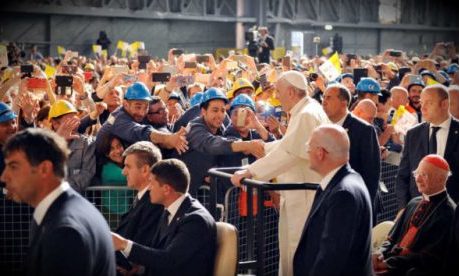The answers that Pope Francis gave to workers at a steel plant in Genoa, Italy, last month suggested an important distinction in the Holy Father’s economic thinking, one that addresses the increasing importance of the financial sector in the contemporary economy.
In meeting the workers of the Ilva steel factory May 27, Pope Francis had asked for the questions in advance, so that he might better prepare his answers.
He touched on a range of topics, especially emphasizing that employment is not only a means of income, but an essential means of contributing to the common good.
He also spoke against competition in the workplace, criticizing “meritocracy” as a way of thinking that blames the poor as “undeserving.”
Yet it was his comments on entrepreneurs and speculators that were most notable, in terms of understanding his broader economic thinking.
One of the questioners asked for a “word of support” for entrepreneurs. In reply, the Holy Father drew a distinction between “entrepreneurs” and “speculators,” praising the “typical virtues” of the former.
“Creativity, love for one’s own business, passion and pride for one’s own work done with the hands and the intelligence and that of his workers,” the Holy Father began, is important.
“There is no good economy without a good entrepreneur, without the ability to create work. In his words, one can feel the esteem he has for the city, for its economy, for the quality of the people, his workers and for the environment, the sea.”
Pope Francis then drew a strong contrast with speculators:
“One of the illnesses of the economy is the progressive transformation of entrepreneurs into speculators. Entrepreneurs must never be confused with speculators; they are two different types.
“The speculator is a figure similar to what Jesus in the Gospel calls [a] ‘mercenary,’ in opposition to the Good Shepherd. They see companies and workers only as means to profit: They use companies and workers to make profit; they do not love them.
“They don’t consider laying off, shutting down and relocating the company a problem, because speculators use and exploit — eat people and means for their own profit.
“When good entrepreneurs inhabit the economy, then businesses are friendly to the people. When the economy is in the hands of speculators, everything is ruined. It becomes a faceless, abstract economy.” Continue reading
Sources
- National Catholic Register article by Father Raymond J. De Souza, editor in chief of Convivium magazine.
- Image: Archdiocese of Baltimore
